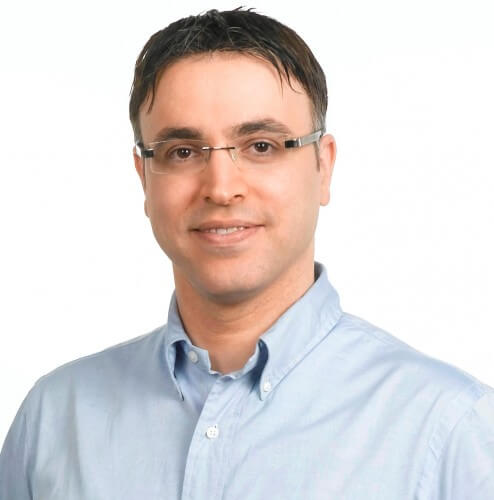The consortium, which includes entities from several countries, will connect the "electronic nose" technology to a smartphone and thus lead to an earlier, faster, cheaper and more accurate diagnosis of many diseases

6 million euros - this is the amount that the European Union will grant to the consortium led by Professor Hossam Hayek of the Technion. Siemens as well as universities, research institutes and companies in Germany, Austria, Finland, Ireland, Latvia and Israel are partners in the consortium. The Israeli partner company in Maged is NanoVation-GS - a 'spin-off' of the Technion - and is headed by Technion graduates Dr. Gregory Schuster and Shaggy Glicksman (M.Sc), who completed their advanced degrees in Professor Haik's laboratory. The company NanoVation-GS specializes in the development and integration of sensors based on nanomaterials for medical devices and other fields.
More information about the company NanoVation-GS
Already in 2011, the European Union allocated 5.4 million euros to a similar association led by Professor Hayek, as part of the seventh framework program of the Union. The current grant, which will be given as part of the Horizon 2020 program, will be used to deepen the technology that Professor Haik has been developing in recent years, since he joined the Technion as a faculty member after completing a post-doctorate at Caltech, California. This is a technology for fast, cheap and non-invasive accurate early diagnosis of diseases based on the oral cavity. Such a diagnosis makes it possible to locate from the general population 'risk groups' destined for specific diseases, and to treat them ahead of time or at an early stage of the disease. This project was a great success both in terms of research and technology.
In the next phase of the research, which will be based on the new grant, emphasis will be given to connecting the aforementioned technology to a smartphone. This project - SNIFFPHONE - will lead to a smartphone-coupled product that will be simple to operate, repeatable, and will not burden the user in his daily functions. This goal will be achieved through tiny sensor arrays that will 'read' the oral cavity and transfer the data to a mobile phone, and from there to an information processing system. This system will decode the data, determine if the subject has the disease, and in case the answer is positive, provide additional details. SNIFFPHONE, in Professor Haik's estimation, is "a winning solution thanks to its characteristics: it will be smaller than existing solutions, cheaper than them, consume little electricity and above all will allow early, immediate, accurate and non-invasive diagnosis. Early diagnosis, needless to say, may save lives when it comes to dangerous diseases such as cancer."
Since joining the Technion as a faculty member in the Faculty of Chemical Engineering at the end of 2006, Professor Haik has won dozens of awards, grants and honorary degrees. Among other things, he won the Marie Curie Award of Excellence, the European Research Council (ERC) grant, grants from the Bill and Melinda Gates Foundation, and more. He was selected to the list of the 35 leading young scientists in the world in the ranking of MIT, received a 'Knight in the Order of Academicians' from the French government and the Herschel Ritz Prize (twice), the Tena Prize for Nanotechnology, the Halvey Prize for Applied Sciences, and about 45 other awards and honors. He was selected to the list of "50 brilliant minds of the country", to the list of "the four scientists whom the world salutes", to the list of "the ten most promising young people in the country", and more. In addition to these awards, given for outstanding research contributions, he also received the highest teaching award given by the Technion - the Yanai Award for Excellence in Academic Education. In 2014, and at the initiative of the president of the Technion, Prof. Haik, under the pedagogical guidance of Associate Professor Miri Barak, led a massive open online course (MOOC - Massive Open Online Course) in the field of "nanotechnology and nanosensors", to which approximately 42,000 people enrolled man.

One response
Well done, a field that has a lot of potential